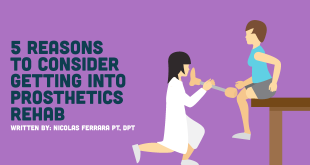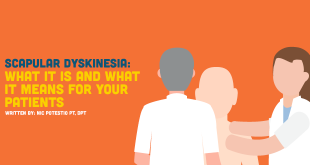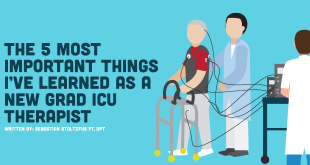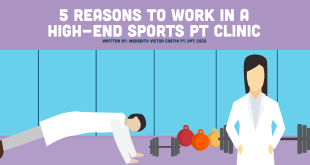Are you considering an orthopedic physical therapy residency?
It’s a big decision, and one of the best things you can do before taking the plunge is talk to as many current and former residents as you can. Residency programs provide an additional layer of education and mentorship beyond what you get in physical therapy school. They can also elevate your professional clout in certain circles, opening doors to opportunity that you might not otherwise land. At the same time, residency programs might involve a cross country move, salary cut, or other considerations that can affect your decision.
Can you tell us a little about yourself?
I received my DPT from Northwestern University in 2012. I worked at the University of Chicago Medicine for two years before moving to Baltimore in 2014 to begin the Johns Hopkins Hospital and George Washington University Orthopedic Physical Therapy Residency. I’m now working as a board certified orthopedic clinical specialist physical therapist at the University of Chicago Medicine. My favorite areas of treatment and research include treating patients with running injuries, chronic and persistent pain, and femoroacetabular impingement/acetabular labral tears.
What made you decide to pursue an orthopedic physical therapy residency?
I decided to pursue residency after working for 2 years and realizing the truth in the saying “the more you know, the more you realize how much you don’t know.” Two years of clinical experience as a licensed physical therapist provided me with wide-ranging patient interactions, encouraging skill development and quick clinical-decision making. Experience gave me focus and focus allowed me to mature in my own calling and within the profession of physical therapy. Maturing as a physical therapist allowed me the focus to know that my expertise is best exercised as a specialist in orthopedic physical therapy.
What residency program are you attending (or did you attend) and why?
I completed the Johns Hopkins Hospital and George Washington University Orthopedic Residency in 2015. This residency program stood out to me because it included clinical mentoring in a hospital based outpatient clinic, clinical mentoring in a high level sports outpatient clinic, and mentoring on teaching in higher education in the George Washington University DPT program. Another unique aspect of this residency was the opportunity to attend Joe Godge’s Orthopaedic Residency Seminar at the University of Southern California for didactic and lab sessions with orthopedic residents and residency faculty from USC. We also spent time learning from Chris Powers at the Movement Performance Institute in California.
Can you give an example of a “typical” week in the residency program?
A typical week consisted of treating patients 3 days a week in clinic at Hopkins and traveling to George Washington University 2 days a week. During the clinic days, we had 2-3 hours of 1 on 1 mentoring sessions with residency faculty. Every Friday morning, we either had a skills lab to learn/practice manual techniques with the entire residency faculty, or we had a journal club based on the module we were studying. During the days we traveled to George Washington University, we had mentoring from the academic director of the residency, Dr. Jennifer Halvaksz. With Dr. Halvaksz’s guidance, we completed lecture presentations and lab lesson plans on various musculoskeletal conditions that we taught to the DPT students. We also participated in the students’ lab practicals.
What is your typical case load in the program?
One of the great things about this residency is that the case load varied from everything including high level high school and college athletes, weekend warriors, adolescents to geriatrics, pre-operative, post-operative, and patients with persistent pain. We treated a diverse patient population in relation to cultural differences, demographic differences, socioeconomic status differences, and education level differences. We treated patients with multiple comorbidities and diagnoses with various functional mobility statuses.
How much does the program cost? (i.e. reduced salary or full salary but paying tuition)?
My salary was reduced during residency. I suggest utilizing APTA resources for salary estimates and information on how to best manage your student loans, if that is a concern for prospective residents.
What opportunities have you or will you seek out after finishing the residency program?
After completing the residency in July 2015, I took and passed my Orthopedic Clinical Specialist Exam in March 2016. I now work as a full time physical therapist in outpatient orthopedics at the University of Chicago Medicine. I am very passionate about treating runners, triathletes, and people with persistent hip pain.
What have you gained from attending the program (knowledge, skills, etc…) that you may not have gained otherwise?
Completing the orthopedic residency has fast-forwarded my thinking of how things come full circle. At the 2015 Orthopedic Section Meeting, Dr. G Kelley Fitzgerald spoke about the importance of positivity and how it relates to change and self-reflection. Not just having a positive outlook, but communicating positively, acting with positive intentions, and initiating positive change for your patients, your peers, and yourself.
In order to move forward down my path towards becoming a positive deviant, the residency helped me understand the importance of seeking out and accepting 360 degrees of feedback all the while never losing enthusiasm. A positive deviant stays motivated when times get tough. As I reflect back on this past year of my orthopedic physical therapy residency, I believe one of the most important and hardest things for a new professional is learning to perceive feedback in a way that always steers one down the path towards becoming a positive deviant. It can be easy to lose sight and to fall into the trap of negative self-talk.
Often times in the beginning of the year I felt that I could not be a positive deviant until I had more experience, until I knew more, until I had better clinical reasoning, but I learned it is important to live in the now. Improving my self-awareness resulted in heightened emotional intelligence and I now realize that it is just as powerful to reflect on the good things I do as it is reflecting on the things I can improve upon.
There are many paths towards excellence and I believe that being an orthopedic physical therapist resident taught me the key to lifelong learning is traveling outside my comfort zone, as long as I deviate positively.
What advice do you have for students that wish to pursue a residency after graduation?
A wise residency mentor told me ‘experts do the basics well.’ I learned that a situation is as complex as you make it.
My advice for students who want to pursue a residency is: stay focused. Stay positive. Stay motivated. Keep things simple. Improve your communication. Value emotional intelligence. And don’t be afraid to fail.
One must always remember that the journey of a physical therapist entails lifelong learning and the continued pursuit of excellence. Being an orthopedic physical therapist resident taught me that the parts of my journey will fall into place to make it whole by focusing on keeping things simple and doing the basics well.
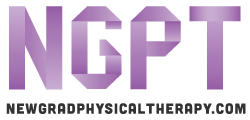 NewGradPhysicalTherapy.com The Largest Online Resource For New Grad Physical Therapists
NewGradPhysicalTherapy.com The Largest Online Resource For New Grad Physical Therapists



